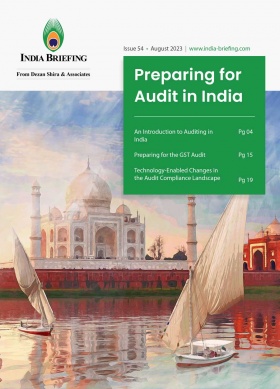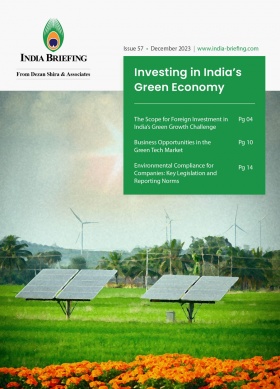India’s Corporate Governance Reforms: Key Regulatory Changes to Pay Attention to in 2024
In 2023, India’s Ministry of Corporate Affairs (MCA) continued its focus on enhancing the ‘ease of compliance’ and ‘ease of doing business’ within the corporate governance framework. We list the key reforms and digital governance measures implemented for smoother company incorporation and liquidation, besides changes to the antitrust regime and accounting standards.
List of India’s corporate governance reforms in 2023
Winding up a business
Key initiatives included the establishment of Central Processing for Accelerated Corporate Exit (C-PACE) for swift approvals in voluntary closures. C-PACE became operational on May 1, 2023, following the Union Budget announcement in 2022. This initiative aims to swiftly approve applications submitted by companies intending to voluntarily cease operations.
Merger control and antitrust regulation
Other significant developments include amendments to the Companies (Compromises, Arrangements and Amalgamations) Rules, 2016, empowering Regional Directors (RD) for faster merger approvals. If a Regional Director fails to file an application before the National Company Law Tribunal (NCLT) for the consideration of a merger scheme under section 232 or does not issue a confirmation order for the approval of the merger under section 233 within the specified time limit, it will be deemed that the RD has no objection, and the confirmation order will be issued accordingly. The Competition (Amendment) Bill, 2023 was passed by both the Houses of the Parliament (Lok Sabha on March 29, 2023, and Rajya Sabha April 3, 2023) and received the Presidential assent (on April 11, 2023).
Read: India’s Antitrust Regulator CCI Circulates Draft Rules on Determining Company Turnover
Highlights of the Competition (Amendment) Act, 2023 include:
- Transactions exceeding INR 20 billion (approx. US$240.24 million) now require approval from the Competition Commission of India (CCI), and the timeline for the CCI to issue a final order on combination transactions has been reduced to 150 days from the previous 210 days.
- The Act broadens the scope of entities that can be considered part of anti-competitive agreements. Previously limited to enterprises or persons engaged in similar businesses, the Act now includes those not engaged in similar businesses.
- A framework for settlement and commitment has been introduced for faster resolution of investigations into anti-competitive agreements (excluding cartels) and abuse of dominant position.
- The definition of control, for the purpose of regulating combinations, is modified to encompass the ability to exercise material influence over the management, affairs, or strategic commercial decisions.
For more information, read our article: Merger Control Regime in India: Analyzing the 2023 Revisions to the Competition Law
Accounting standards
Amendments in accounting standards and incorporation rules increased disclosure requirements while reducing bureaucratic hurdles. The Companies (Indian Accounting Standards) Amendment Rules, 2023 was issued by the MCA through G.S.R. No. 242(E) dated March 31, 2023, effective from April 1, 2023. This rule introduces amendments to IndAS 1, IndAS 8, and IndAS 12, addressing disclosures of material accounting policies, the definition of accounting estimates, and deferred tax related to assets and liabilities arising from a single transaction, among other changes. Consequential amendments are also made in IndAS 107, IndAS 34, and IndAS 101. Additionally, some editorial corrections have been implemented in IndAS 101, IndAS 102, IndAS 103, IndAS 109, and IndAS 115.
Annual meetings
The General Circular no. 09/2023 extended timelines for virtual Annual and Extraordinary General Meetings, promoting corporate procedure flexibility.
Insolvency resolution
Removing the processing costs for shifting registered offices after the resolution plan approval under the Bankruptcy Code reflected a pragmatic regulatory approach. To secure this, the MCA amended the Companies (Incorporation) Rules, 2014, as per notification number G.S.R. 790(E) dated October 20, 2023. The relocation of the registered office is now permitted when new management takes over the company under a resolution plan approved pursuant to Section 31 of the Insolvency and Bankruptcy Code, 2016 (31 of 2016). However, this allowance applies if there is no pending appeal against the resolution plan in any Court or Tribunal, and no inquiry, inspection, or investigation is pending or initiated after the approval of the resolution plan.
Electronic processing of forms
The processing type for additional e-forms has been transitioned from Non-STP (Straight through Process) to STP (Straight through Process). This alteration means that these forms can now be electronically approved without human intervention. This change is expected to enhance the ‘ease of compliance’ and ‘ease of doing business’ by streamlining and expediting the approval process.
Dematerialization of shares
Additionally, the Companies (Prospectus and Allotment of Securities) Second Amendment Rules, 2023, has mandated dematerialization of shares for larger private companies, aligning regulations with contemporary market trends. It was notified under GSR 802(E) dated October 27, 2023. The amendment includes a sufficient transitional period for compliance with this requirement.
2024 outlook
Altogether, the regulatory changes and digitization measures indicate the government’s commitment to fostering a dynamic, efficient, and responsive corporate ecosystem in India.
Notably, 196,028 companies and LLPs were incorporated in India between January and November 2023. This is higher than 188,364 companies and LLPs incorporated during the corresponding period of calendar year 2022.
Going into 2024, companies are advised to pay attention to the requirements of streamlined compliances under the government’s digital push to save on costs and risk of incompliance. Firms should also ensure key support materials are in place for audit purposes and cyber security mechanisms are robust.
For more information on company incorporation, liquidation and winding up of a company, and quarterly and annual compliance, feel free to contact the business advisory experts at Dezan Shira & Associates at india@dezshira.com [Delhi NCR: delhi@dezshira.com; Mumbai: mumbai@dezshira.com; Bengaluru: bengaluru@dezshira.com]
About Us
India Briefing is produced by Dezan Shira & Associates. The firm assists foreign investors throughout Asia from offices across the world, including in Delhi and Mumbai. Readers may write to india@dezshira.com for more support on doing business in India.
We also maintain offices or have alliance partners assisting foreign investors in Indonesia, Singapore, Vietnam, Philippines, Malaysia, Thailand, Italy, Germany, and the United States, in addition to practices in Bangladesh and Russia.
- Previous Article Recent Changes to Form 10F: A Guide for Non-Residents Seeking to Claim DTAA Benefits in India
- Next Article India-Malaysia Economic Partnership: Challenges, Prospects, and Strategic Collaborations









